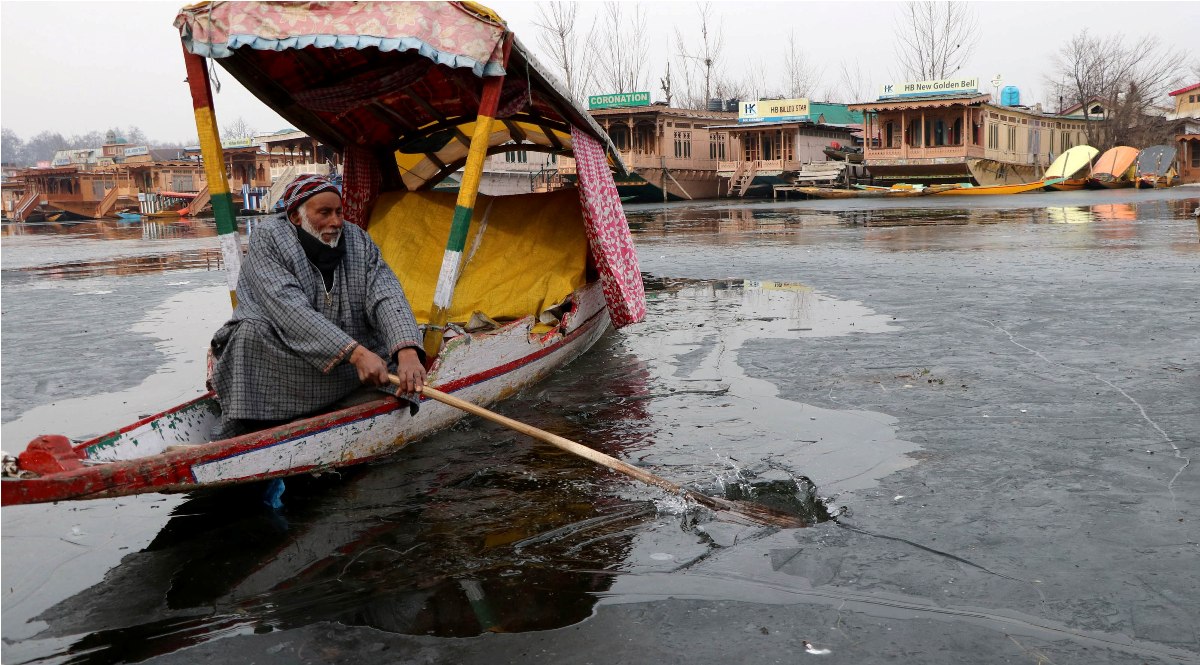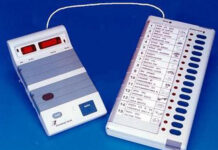by Khalid Bashir Gura
SRINAGAR: As the weak sun shines coldly and the icy wind sweeps making empty shikaras bob, one of the green metallic shutter leads to the office of the House Boat Owners Association not far away from the desolate, dismal looking Dal Lake. It is a place of warmth for the Kashmir’s oldest hospitality professionals.

The members of the association warm themselves by the chimneys, glued to the TV screen casually flipping news channels. The office usually remains busy and crowded as the Association has more than 900 members.
Time and tourists seemed to have taught them immaculate English and communication skills enough to make any stranger enamour them.
Their laughter, however, seems superficial and smiles profound as they huddle around each other to share struggle that is exclusive to them. Lacking work and fighting pain, they are floating and rowing on hope. One day, they believe, there will be light at the end of the tunnel.
The Association members recall the day when worst happened. It was on that day when advisory was issued by the government that their livelihood was snatched, as tourists were taken away for security concerns from their Houseboats. That day, their hopes and promises sunk deep in the Dal Lake and the fate suddenly froze for them, at least for the last half of the year. Since then, they are rowing against the fissures of hopelessness, frustration, and terrible times.
There was a premonition of something frightening lurking in the abruptness of centre’s decision-making, members said.
Suddenly Dal Lake swarming with tourists got deserted. No one was in sight. Empty Houseboats, empty shikaras, desolate boulevard was the only sight. Silence and stillness dominated all these months. Houseboats keep floating on hope and empty bobbing shikars wait vainly.
“We are aware of the certainty of uncertainties in Kashmir,” quipped Nazir Ahmad, the houseboat owner at Ghat No 9. “But the advisory was out of a blue.”
Other members chipped in narrating the ordeals faced by all of them, exclusively and intensely special post Aug-5, 2019.
“It was the summer but Dal-lake froze for us,” lamented Abdul Rashid Kaloo, General Secretary of the Association. “The advisory was as if our spinal cord was broken by the sudden punch.”
As other members drop in with gloomy faces, sighing, they listen to their secretary keenly and nod.
‘’Before advisory it was fine. Tourists were coming from all over India even though the government after months of communication clampdown and curfew did issue the other advisory for tourists to come back but nobody came,” added Kaloo.
It is not even trickling down.
Those who come don’t spend much. The tourists that we yearned for aren’t ready for a multitude of reasons. During winters tourists came for winter sports to Gulmarg but not many this fall.
The communication clampdown severely impacted the sector. “How can we communicate or even how tourists will stay in touch with their families,” asked one of the members.
Everyone associated with this industry is suffering: Shikarawalas, artisans, hawkers, restaurants owners and taxi drivers. “It has shot the tyres of our economy,” said Kaloo. “In a houseboat, there is a cook, waiter, guide, caretaker; they all are idle.”
The hopes are not unreasonable. “Why can’t the central government undo the damage they have inflicted on us. They should tell the people to come back to Kashmir as it is safe as it was earlier?”
Javead Ahmed the treasurer of the association began as his secretary stops conversing to attend a call.
“The Delhi media is playing havoc with the psyche of their viewers. Watching them gets an impression that it is forever bombing and dying,” Ahmad said. “Centre must tighten its reins on its jingoistic media for making a mountain out of a mole and blowing trumpets of fear and war.”
“It is calm, peaceful, at least for tourists, isn’t it?” he asked, visibly angry with the bad TV.
While flipping with his phone, glued to its internet less screen he added that these houseboats are their livelihood, and their inheritance. These houseboats represent Kashmir and its identity, he asserted. “Houseboats float because of tourists and not by water alone,” he said.
Joining back the conversation, Rasheed says the houseboats need constant renovation which costs a good amount of money. “When there are no tourists how can we look after our families and these huge floating structures?”
Members said the government is charging them power tariff and water fees when the government itself damage their business. “Our houseboats float on hope, so do we,” Rasheed said.
Recalling 1990’s, the members said it wasn’t as worst as it is now. “We have survived the war for years,” commented one of the aged houseboat owners. “During 90’s many of us went to many places in India, assured and convinced tourists of their safety, brought them back slowly and revived this industry. But at that time at least we could go there and also times weren’t as worst as they are now.” He feels that this time seemingly tourists are being convinced not to visit Kashmir.
Lastweek, Javead said, a tourist from Madras called him and expressed his worry about their safety in coming to Kashmir. “They feel there are riots in Kashmir. But I told them it is safer than India. Another tourist didn’t come because of lack internet,” he said.
Javed said the families associated with the hospitality sector are struggling. “Some of our kids dropped out of schools in cases where parents lacked any alternative source of income,” Javaid said. “Some of them are hawkers, or selling pea nuts for the sake of supporting families.”
They have high hopes from 2020. “All we need is Roti, Kapda and Makaan,” one greying elder said, insisting, “Haak Batta.”
Near Dal Lake, every Ghat appeared tourist less. Pheran clad Shikarawalas snatching moments of warmth from the weak wintry sun, their face stubbed, desperate and running after anyone that appears tourist-like.
Some Shikarawalas reclined in their shikaras, some sitting on banks, idle, gossiping in groups.
One of them, when approached to talk, got angry and said they are tired of sharing their pain. “Please spare us. We are living through the worst times,” he shouted. In anger and frustration, he joined his cohorts who try to pacify him.

Walking ahead of the desolate, bleak banks where shikaras wait endlessly for someone to get into them, at Ghat No 12, a young boy in his teens, Shahid appeared unlike the previous one. He talked about the high airfares to Kashmir as one major contributor to the crisis. “We hardly earn much but we keep hoping,” he said.
The sight of an approaching vehicle with some tourists sketched hopes on Shahid’s face and soon he was out of sight to welcome and persuade them for the ride in his Shikara.
Soon the hawkers selling warm clothes, cheap Kashmiri embroidery, and arts and crafts shoppers set their hopeful eyes on a single approaching with tourists while some kept chasing some foreigners.















